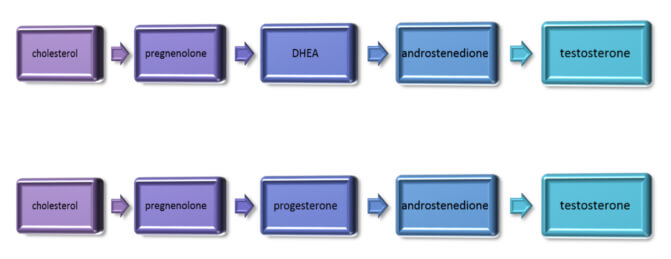For quite some time, doctors warned against the dangers of cholesterol. However, what most people do not realize is that cholesterol plays a vital role in hormone production. Cholesterol is the basis for the manufacturing of steroid hormones crucial to optimum health. The connection between cholesterol and testosterone is essential to understand.
How are testosterone and cholesterol linked, and why is it necessary to maintain proper levels of both in the body?
Cholesterol is the testosterone precursor, which we will examine in detail in the next section. Although it essentially comes from cholesterol, testosterone also has a direct impact on cholesterol levels. As the body ages, testosterone levels decrease, and LDL and total cholesterol levels tend to increase. Coincidence? Read on to find out.
In this report on testosterone levels and cholesterol, we examine the following:
- What cholesterol is and why it is crucial for testosterone
- How testosterone influences cholesterol
- Whether testosterone therapy can alter cholesterol
The connection between cholesterol and testosterone is vital to understand for optimum health.
What Is Cholesterol and Why Is It Crucial for Testosterone?
The body’s cells contain a waxy substance called cholesterol that is used to make vitamin D and steroid hormones such as pregnenolone, progesterone, testosterone, DHEA, cortisol, and more. When the cells do not have enough cholesterol and testosterone levels decline, the body can enter into a state of hormonal imbalance.
There are three primary types of cholesterol:
- Low-density lipoprotein (LDL) which is often called bad cholesterol. Although too much of this cholesterol can lead to plaque buildup in the arteries, it is also the cholesterol used to manufacture hormones.
- High-density lipoprotein (HDL) which is the “good” cholesterol that shuttles excess LDL cholesterol to the liver for removal from the body.
- Very low-density lipoprotein (VLDL) which may also promote plaque buildup.
When too much LDL cholesterol builds up in the arteries, it can form plaque that sticks to the arterial walls and blocks blood flow. If a piece of that plaque breaks free, it can cause a stroke or heart attack.
The action of turning cholesterol into testosterone engages various enzymes, amino acids, proteins, and hormones in a multi-step process.
As we look at cholesterol and testosterone production, we find that the process that starts with cholesterol and ends with testosterone looks like this:

There are two pathways to testosterone production, the other one is as follows:
You cannot have testosterone without cholesterol.
How Does Testosterone Influence Cholesterol Levels?
The connection between low testosterone and high cholesterol comes in various forms, beginning with the weight gain often associated with lower testosterone levels. Excess abdominal fat is linked to insulin resistance, elevated glucose levels, high LDL cholesterol, metabolic syndrome, high blood pressure, and increased risk of cardiovascular disease (CVD). Because HDL cholesterol levels also decline, they cannot remove the excess LDL cholesterol from the bloodstream, resulting in the buildup of dangerous plaque deposits.
Plaque buildup often leads to problems such as atherosclerosis and cardiovascular disease. Men with abnormal testosterone and cholesterol levels are at a higher risk of developing CVD, as well as metabolic syndrome and type 2 diabetes.
Testosterone decline is not only associated with higher LDL but also lower HDL cholesterol levels. Low high-density lipoprotein is a recognized cardiovascular risk factor.
Men, who experience the greatest decline in testosterone levels as they age, have a higher cardiovascular risk factor than women. Studies have also shown low testosterone to increase CVD and type 2 diabetes risk significantly. Understanding this connection between cholesterol and testosterone is crucial to finding ways to help the body balance both levels.
Low testosterone often increases LDL cholesterol and decreases HDL cholesterol levels.
Can Testosterone Therapy Alter Cholesterol Levels?
As we begin looking at testosterone therapy and cholesterol, studies have shown positive correlations with little to no increased risk of cardiovascular events. For many years, mainstream doctors warned men with CVD to stay away from testosterone replacement therapy (TRT), that it was bad for the heart. Extensive research has shown this to be false. If anything, the many protective benefits of testosterone for the heart make it even more important for men with any form of cardiovascular disease to seek out hormone testing to check testosterone levels.
A study out of Germany looked at 334 men with low testosterone who were treated with testosterone therapy for up to 15 years. Not only does this study show an average increase in HDL cholesterol from 38 mg/dL to 53 mg/dL but it also highlights a decline in LDL cholesterol from an average of 157 mg/dL to 110 mg/dL. Additional benefits experienced by the participants included:
- Weight loss
- Decreased waist circumference
- Lower blood pressure
- Improved blood sugar levels
The fact that the men received treatment for up to 15 years shows the benefits of long-term testosterone therapy without increased risk of CVD events. Overall, the cardiovascular risks decreased, making cholesterol and testosterone treatment using TRT beneficial for those with low testosterone levels.
Many other studies highlight the positive connection between improving the levels of cholesterol and testosterone therapy. Since testosterone improves body composition, lowers blood sugar and inflammation, and decreases risk factors associated with metabolic syndrome, CVD, and type 2 diabetes, RX Hormone recommends that individuals concerned about these issues contact our medical clinic for a confidential phone consultation at no charge.

